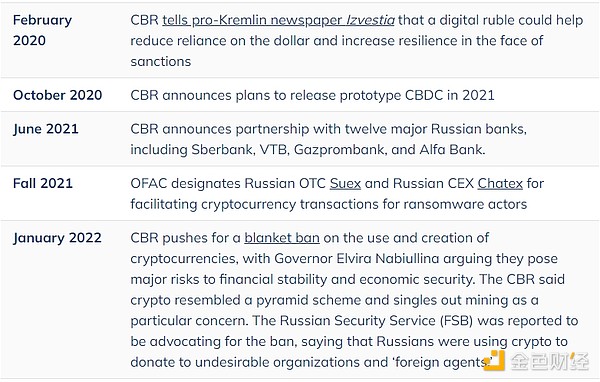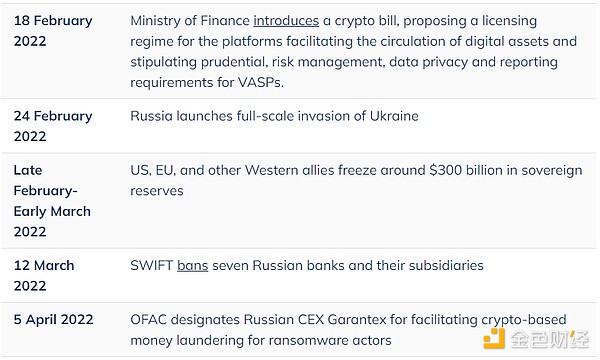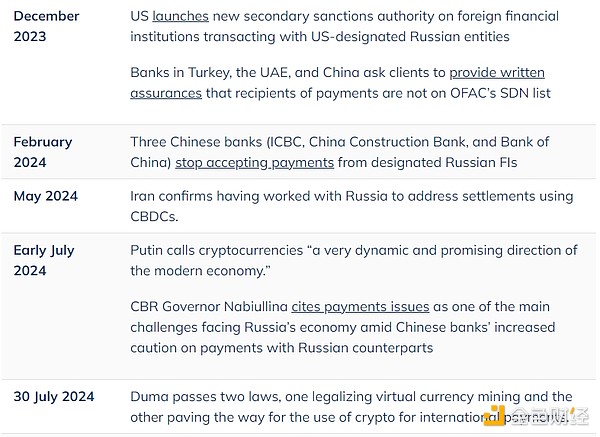New laws will take effect in September for cross-border payments and in November for cryptocurrency mining, allowing Russian companies to use cryptocurrency for international trade and authorizing approved entities to mine digital assets.
Written by: Chainalysis
Translated by: Deng Tong, Golden Finance
In response to the increasing financial pressure brought by Western sanctions, Russia has enacted significant legislation to legalize cryptocurrency mining and allow the use of cryptocurrency for international payments. According to Bloomberg, the bill was signed into law by President Vladimir Putin on August 8, with cryptocurrency payment trials set to begin this month.
This marks a significant departure from the government's previous stance, as the Central Bank of Russia (CBR) had previously pushed for a complete ban on cryptocurrency by 2022. The new laws will take effect in September for cross-border payments and in November for cryptocurrency mining, enabling Russian companies to use cryptocurrency for international trade and authorizing approved entities to mine digital assets.
Putin has urged Russia not to "miss the opportunity" to regulate cryptocurrencies, emphasizing the increasing role of cryptocurrencies in global payments and the potential to reduce reliance on the US dollar. Key officials, including the bill's author Anton Gorelkin and the head of the Central Bank of Russia Elvira Nabiullina, have explicitly acknowledged that these legislative changes are aimed at mitigating the impact of sanctions and promoting international payments.
Shift in Russia's Attitude Towards Cryptocurrency
Despite the recent legislation, Russia still prohibits the use of cryptocurrency for domestic payments. However, this has not deterred widespread use of cryptocurrency in the country. In fact, Russia has consistently ranked high in our annual Global Cryptocurrency Adoption Index, consistent with our broader observation that comprehensive bans on cryptocurrency often prove ineffective, as they do not significantly suppress usage but rather drive it towards informal or less regulated channels.
Meanwhile, prior to the recent legislation, cryptocurrency-related banking services in Russia have been on the rise. According to the Businessman Report, Russian billionaire Vladimir Potanin's Rosbank paved the way for enterprise cross-border cryptocurrency payments in June last year, followed by several other banks introducing similar services.
Evading Sanctions Through Cross-Border Payments
The Central Bank of Russia is leading the integration of cryptocurrency into Russia's cross-border payment financial system, creating an experimental infrastructure that allows approved Russian companies and entities to use digital currency for international trade. According to official statements, approved mining entities will also be allowed to settle transactions using cryptocurrency.
These recent legislative efforts on cryptocurrency are part of a broader Russian initiative aimed at developing alternative payment mechanisms to alleviate Western sanctions pressure and reduce reliance on the US dollar, a long-standing goal for Russia, especially amid escalating geopolitical tensions.
Expanded Regulatory Authority for the Central Bank of Russia
The new legislation consolidates the Central Bank of Russia's control over cryptocurrency, enabling it to closely supervise and monitor these transactions. While the Central Bank of Russia is still testing its central bank digital currency (CBDC), with the digital ruble expected to be launched in 2025, this legislation allows for the use of existing cryptocurrencies under the supervision of the central bank.
Russia has been exploring various methods to circumvent the US-dominated financial system, including blockchain-based initiatives in collaboration with the BRICS bloc and potential partnerships with Iran to introduce a gold-backed stablecoin. The Russian Financial Messaging System (SPFS) – Russia's alternative to the SWIFT financial messaging system – is another key component of this strategy, although its usage remains limited.
Potential for Exchange Platforms to Facilitate International Transactions
According to Bloomberg, authorities are exploring ways to legalize cryptocurrency exchanges. Finance Minister Anton Siluanov stated, "We have not yet found a solution." However, according to the Russian news outlet Businessman Report, Russia is advancing plans to launch two new cryptocurrency exchanges in St. Petersburg and Moscow. The St. Petersburg exchange is reported to be supported by the infrastructure of the St. Petersburg Currency Exchange (SPCE), although SPCE has denied involvement, as reported by the national news agency Interfax. Despite regulatory contradictions, Russia already has a thriving cryptocurrency ecosystem.
Some of Russia's largest non-KYC exchanges, such as Tetchange, 100btc, Bitzlato, Suex, and Garantex, are located within or near the Federation Tower, a two-story skyscraper complex within the Moscow International Business Center (also known as Moscow City). While some services, such as Suex OTC, have reduced activity following designation by the US Department of the Treasury, others, like Garantex, have maintained stable operational levels.
Garantex is a key player in the Russian cryptocurrency market and, despite being designated by the US and UK Offices of Foreign Assets Control (OFAC) and Office of Financial Sanctions Implementation (OFSI) respectively, it may continue to play a significant role. This centralized exchange (CEX) processes a significant volume of transactions involving designated participants from Russia and Iran, demonstrating its utility in evading sanctions. Under the new legislation, given Garantex's deep liquidity on major blockchains, the Russian government may officially or unofficially leverage services like Garantex. While Garantex has processed nearly $100 billion in transactions since 2018, such large-scale activity does not necessarily equate to state-supported large-scale evasion of sanctions and should be carefully assessed. It is worth noting that not all Garantex users are Russian nationals or residents, and they do not act on behalf of the Russian government. Additionally, a significant amount of sanctions evasion activity occurs outside official government channels and through traditional off-chain methods, such as private investment vehicles and offshore shell companies.
Another exchange that could facilitate sanctions evasion through cryptocurrency is Exved, which closely collaborates with InDeFi Bank, co-founded by Sergey Mendeleev, the founder of Garantex, and Alexander Lebedev, a former KGB officer and media tycoon. Exved has been promoting imports and exports even before the new legislation was enacted.
In the backdrop of evolving legislative positions, Russia's cryptocurrency business has seen mixed success. While Garantex represents a success story, other global exchanges have exited the Russian market citing compliance issues, and some local exchanges have even shut down. Last year, Binance sold its Russian business to CommEX, which suspended services earlier this year, reflecting broader challenges faced by businesses operating in Russia following the full-scale invasion of Ukraine in February 2022.
While it is difficult to quantify the true impact of certain sanctions actions, Russian officials point to the fact that sanctions have affected Moscow's ability to handle cross-border trade, indicating that the impact is significant enough to spur the urgency to legalize and invest in alternative payment channels that were once condemned.
Cryptocurrencies Available for Payments
According to the Businessman Report, Russia is planning to introduce a digital currency backed by the renminbi and the BRICS countries, with support from the new cryptocurrency exchanges being developed in St. Petersburg and Moscow. Additionally, considering the liquidity and global popularity of centralized stablecoins like USDT and USDC, they may also be considered for use, but their centralized control and regulatory responsiveness pose interruption risks. The digital ruble, once launched, may also play a role, but its attractiveness to other countries remains uncertain given the severe economic sanctions against Russia. Finally, approved mining entities may mine Bitcoin, which still has strong global liquidity and popularity.
Challenges of Scale in Evading On-Chain Sanctions
The move by Russia to integrate cryptocurrency into its financial system could potentially enhance its ability to bypass the US-dominated financial system and engage in non-dollar denominated trade. However, given that Russia's total foreign exchange reserves are slightly below $500 billion, with around $300 billion frozen in dollars, euros, and pounds, large-scale on-chain sanctions evasion remains highly unlikely. As we have previously discussed, the current cryptocurrency market simply does not have the liquidity to accommodate such large-scale transactions.
While large-scale sanctions evasion at the national level is unlikely, small-scale on-chain sanctions evasion could still have significant implications for national security, compliance, and investigations. Potential actors seeking to exploit the new developments may include fundraisers supporting pro-Russian armed groups in Ukraine, facilitators aiding oligarchs and other political figures in capital flight, or Russian-language instant exchanges without KYC requirements providing entry and exit services for sanctioned Russian banks. These small-scale activities could have significant implications, highlighting broader security and compliance risks associated with such transactions.
Below, we can see the interface of Russian instant exchanges.

Users can transfer funds from sanctioned Russian banks (such as Sberbank) without any KYC and exchange them for cryptocurrency. This means that users can effectively circumvent the legal currency ban on sanctioned Russian banks.
Russia's shift in attitude towards cryptocurrency is a deliberate response to Western sanctions, aiming for an alternative financial system that is less reliant on the US dollar. The success of this initiative will depend on how effectively Russia can overcome regulatory barriers, manage sanctioned entities, and establish the necessary infrastructure and foreign partnerships to support these transactions.
Impact of the Cryptocurrency Mining Bill
In addition to supporting the economy during times of war, Russia is also attempting to surpass the US and become a global leader in cryptocurrency mining.
The recently passed cryptocurrency mining bill introduces a structured framework for cryptocurrency mining, creating a registry that allows Russian legal entities and entrepreneurs to engage in mining activities. The framework aims to regulate large-scale mining operations, while small-scale mining enterprises under energy consumption restrictions will not be considered. Language from the early drafts of the mining bill was removed, indicating that authorities may be seeking to avoid actions that could adversely affect Russia's robust cryptocurrency ecosystem. In particular, the proposed ban on organizing cryptocurrency transactions was removed from the final version of the bill, as reported by the Russian news outlet RBC, avoiding the potential closure of Russian central exchanges and providing a legitimate way for miners to monetize their activities.
Under the new law, miners must report their activities to the local financial monitoring agency Rosfinmonitoring and provide wallet addresses to the security department, effectively legitimizing their operations under national supervision. This regulatory measure also raises important questions about the classification of cryptocurrency mining outside Russia, especially considering the extensive sectoral sanctions imposed by the US and Europe on Russia's energy sector. While international sanctions against Russia's energy resources continue, the authorization and supervision of cryptocurrency mining in Russia demonstrate strategic consistency with national interests.
Next Steps: Impact on Authorities, VASPs, and TradFi
While these legislative changes may enhance Russia's ability to engage in international trade through cryptocurrency, they may also raise the vigilance of US and EU authorities—particularly regarding counterparty risks and connections with some of Russia's more significant trading partners, such as China and Iran. As these laws increase the connectivity of global trade, Western authorities may continue to focus on monitoring and mitigating the risks associated with on-chain and off-chain financial activities related to sanctioned entities.
More broadly, from Venezuela to Russia to Iran, many heavily sanctioned countries have historically attempted to use alternative payment mechanisms, including cryptocurrency, to circumvent sanctions—a challenging endeavor. The transparency of blockchain technology allows investigators to monitor and disrupt fund flows in real time. Wallet addresses associated with CEX, mining services, and other on-chain entities can be identified, attributed, and potentially sanctioned. Additionally, the liquidity constraints of the cryptocurrency market mean that attempts to move large amounts of assets onto the chain may attract the attention of blockchain observers and even disrupt the stability of the entire market.
For virtual asset service providers (VASPs) and traditional financial institutions, these developments underscore the importance of strengthening due diligence on Russian mining entity counterparties. Overall, these changes make it more challenging for CEX to engage with Russian entities, aligning with the broader trend of derisking and de-banking in Russia since the full-scale invasion of Ukraine.
Chainalysis's suite of on-chain data, monitoring, and investigative tools enables investigators and compliance professionals to proactively monitor these networks and take disruptive action, making it increasingly difficult for designated entities to abuse cryptocurrency to evade sanctions.
Timeline of Russia's Shift in Digital Asset Stance




免责声明:本文章仅代表作者个人观点,不代表本平台的立场和观点。本文章仅供信息分享,不构成对任何人的任何投资建议。用户与作者之间的任何争议,与本平台无关。如网页中刊载的文章或图片涉及侵权,请提供相关的权利证明和身份证明发送邮件到support@aicoin.com,本平台相关工作人员将会进行核查。




